11th Marine Artillery Regiment
The 11th Marine Artillery Regiment (France) (French: 11e Régiment d'Artillerie de Marine, 11e RAMa) is an artillery regiment of the French Army. The regiment constitutes the fire support unit of the 9th Marine Infantry Brigade. The regiment employs around 950 men, fielding TRF1 155mm howitzers and MO-120-RT-61 120mm mortars. The regiment was founded in a third operational phase in 1951.
| 11th Marine Artillery Regiment | |
|---|---|
| 11e Régiment d'Artillerie de Marine. | |
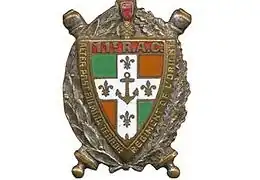 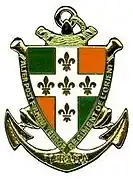 Regimental Insignia of the 11e R.A.C Regimental Insignia of the 11e R.A.Ma | |
| Active | 1785 1914 – 1946 |
| Country | France |
| Branch | French Army |
| Type | Marine Troops |
| Role | Artillery Amphibious warfare Reconnaissance Anti-aircraft warfare |
| Part of | 9th Marine Infantry Brigade 1st Division |
| Garrison/HQ | Saint-Aubin-du-Cormier, France |
| Nickname(s) | Regiment of the Orient |
| Motto(s) | Alter post fulmina terror "L'autre terreur après la foudre" (Fr) |
| Colors | Red and blue |
| Anniversaries | Bazeilles |
| Engagements | World War I |
| Battle honours |
|
| Insignia | |
| Beret badge of the Troupes de Marine |  |
| Abbreviation | 11e RAMa |
Organic role
The 11e RAMa is organically attached to the 9th Marine Infantry Brigade (9e B.I.Ma), where the regiment fulfills the role of fixed artillery fire support. The regiment nevertheless a highly mobile unit, trained for amphibious warfare since initial formation.
Creation and different nominations since 1785
- In 1785: creation at Port-Louis, Morbihan of Morbihan of the Regiment of the Orient (French: Régiment de l’Orient). The 11e RAMa conserved the motto «Alter Post Fulmina Terror», « The other Terror after Bolts of Lightning » which resides on the insignia.
- In 1919: the 11th Mixed Malagasy Colonial Artillery Regiment (French:11e Régiment d'Artillerie Coloniale Mixte Malgache) sees daylight.
- In 1924: the mixed regiment became the Autonomous Colonial Artillery Group of the Levant then was designated as Colonial Artillery Regiment of the Levant R.A.C.L (French: Colonial Artillery Regiment of the Levant).
- On 5 May 1929: creation at Lorient of the 11th Colonial Artillery Regiment, 11e R.A.C; derived of the 1st Colonial Artillery Regiment, 1e R.A.C.Implanted in Brittany land, the 11th Colonial Artillery Regiment was formed from cadres returning from all the colonies and of a majority of Malagazy Bigor (English: term for marine artillery specialists of the French Army).
- In 1932: the regiment was designated as 11th Heavy Hippomobile Colonial Artillery Regiment. The regiment was armed by the old 155mm Scheider and the old long range 105mm series, mainly the artillery cannons of World War I. In 1939, the regiment ascended powerfully and was seen brought up to maximum operational capability within staffs and materials as of 1939.
- 1940: disappeared, the artillery depot takes charge of participating in combat operations in defense of the city of Lorient. Several officers and Bigors were lost to combat operations along the five roads of Guidel in June 1940.
- In October 1945: the 11th Colonial Artillery Regiment, 11e R.A.C was recreated from the Colonial Artillery Regiment of the Levant R.A.C.L, artillery regiment veteran of the campaigns of Italy, the disembarking in Provence and numerous combat operations in the Rhodanien couloirs and until reaching Germany. The regiment was stationed in the region of Bad Kreuznach.
- On 15 February 1946: the regiment was dissolved.
- On 1 April 1951: the 1st Colonial Artillery Regiment 1e R.A.C of Melun enacted the 1st Group of the 11th Marine Artillery Regiment. Starting from 1955, the regiments formed artillery specialists destined for North Africa and was designated as Instruction Center of the 11th Colonial Artillery Regiment in 1958. Thousands of men were formed within the ranks and specialties prior rejoining operational units in Algeria.
- In June 1963: the regiment was redesignated as 11th Marine Artillery Regiment.
History since 1813
The 1st Colonial Artillery Regiment 1e R.A.C of Melun enacted the 1st Group of the 11th Marine Artillery Regiment.
The 1e R.A.C was twice subdivided into sub units designated "11th Colonial Artillery Regiment"; the "Colonial" units are now named Troupes de marine. The 11e RAMa thus maintained the motto Alter Post Fulmina Terror ("The other Terror after Bolts Lightning").
The current regiment was founded in 1951 and was renamed 11e RAMa in June 1963. In 1979, the regiment took garrison in Camp La Lande d'Ouée near Saint-Aubin-du-Cormier.
Campaigns
|
Campaign Participation Engagement
|
Campaign Participation Engagement
Campaign Participation Engagement
|
Campaign Participation Engagement
|
Overseas operations
The 11e RAMa has been deployed overseas more times than any other artillery unit of the French Army. From 1978 to 1980, the regiment was involved in Opération Tacaud, in Chad. It took part in the battle of Ati in support of 2 combat companies of the 3rd Marine Infantry Regiment and a squadron of the 1e REC. On 5 March 1979, during the battle of Abéché where the regiment supported the same marine infantry company of the 3e RIMa and a squadron of the RICM, the same artillery battery exercised a horizontal firing round series with 105HM2 howitzers.[2] From 1984 to 1985, the regiment was involved in Opération Manta.
Lebanese Civil War (1975–1990)
The regiment partook in various peacekeeping missions in Lebanon on numerous yearly designated occasions. From 1983 to 1984, the regiment integrated the corps of the Multinational Force in Lebanon during the Lebanese Civil War along with the 1st Parachute Chasseur Regiment, the 1st Parachute Hussard Regiment and the 31e Brigade which included the Operational Group of the Foreign Legion, the 1st Foreign Cavalry Regiment, the 2nd Foreign Infantry Regiment and the 17th Parachute Engineer Regiment.
Gulf War (1990–1991)
The regiment was engaged in the Gulf War in 1991 part of Opération Daguet along with 1st Foreign Cavalry Regiment, the 2nd Foreign Parachute Regiment, the 2nd Foreign Infantry Regiment, the 6th Foreign Engineer Regiment, French paratroopers regiments including components of the 1st Parachute Hussard Regiment, the 17th Parachute Engineer Regiment and other airborne contingents.
Foreign operations (1991–2001)
The 11e RAMa was engaged in ex-Yugoslavia from 1993 to 2000, and in Opération Turquoise in 1994, in Rwanda. It then intervened in the Comoros.
Global War on Terror (2001–present)
Presently, the 11e RAMa is involved in Opération Licorne in Côte d'Ivoire; in the current War in Afghanistan with the French forces in Afghanistan, notably the GTIA Kapisa; in Lebanon with Opération Baliste; in Kosovo and in Mali (Operation Serval and Operation Barkhane).
Organization
The 11e R.A.Ma is composed of 900 artillery marines articulated in 7 Artillery batteries:
- 1 command and logistics artillery battery.
- 3 ground artillery batteries equipped with CAESER and 120mm type mortars.
- 1 Ground-to-Air artillery battery with missiles and 20mm cannon.
- 1 artillery renseignement brigade battery.
- 2 artillery intervention reserve batteries destined to reinforce in times of peace, the operational capacities of the regiment.
Traditions
Insignias
 Insignia of the 11e R.A.C
Insignia of the 11e R.A.C Insignia of the 11e R.A.Ma
Insignia of the 11e R.A.Ma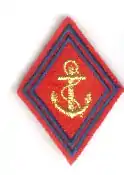 Shoulder Insignia
Shoulder Insignia
Regimental Colors
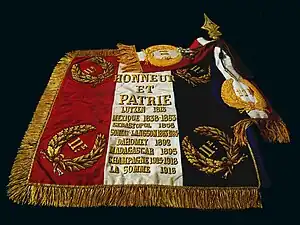
Decorations
The Regimental Colors of the 11th Marine Artillery Regiment 11e RAMa is decorated with:
- Légion d'honneur on 20 May 1910[3]
- Croix de guerre 1914–1918 with:
- 2 palms ( cited twice in 1916 and 1918 at the orders of the armed forces)
- Fourragère with:
- colors of la croix de guerre 1914–1918.
- Two artillery batteries with :
- 1972 citation at the orders of the armed forces
- 1978 citation at the orders of the armed forces
- Croix de guerre des théâtres d'opérations extérieures with
- 1 palm ( the regiment for engagement in Kuwait in Opération Daguet, 1990 )
- Croix de la Valeur militaire on May 4, 2013 with:
- 1 palm ( cited at the orders of the armed forces for service in Afghanistan )
- Croix de la Valeur militaire on June 12, 2014 with:
- 1 palm ( cited at the orders of the armed forces for service in Mali)
 Legion of Honneur
Legion of Honneur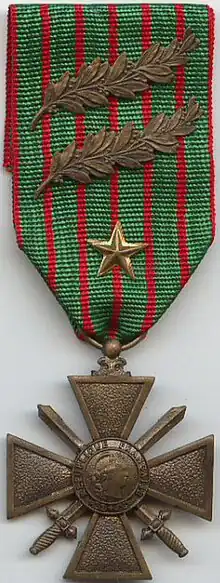 Croix de guerre 1914-1918 with 2 palms
Croix de guerre 1914-1918 with 2 palms fourragère with colors of croix de guerre 1914-1918.
fourragère with colors of croix de guerre 1914-1918. Croix de guerre des théâtres d'opérations extérieures with 1 palm
Croix de guerre des théâtres d'opérations extérieures with 1 palm Croix de la Valeur militaire
Croix de la Valeur militaire
Battle Honors
- Lützen 1813;
- Mexique 1838–1863;
- Sébastopol 1855;
- Sontay Lang Son 1883–1884;
- Dahomey 1892;
- Madagascar 1895;
- Champagne 1915–1918;
- La Somme 1916.
- Koweït 1990–1991[1]
Regimental Commanders
|
|
See also
Notes and references
- "Édition Chronologique n° 45 du 29 octobre 2010".Le Ministère de la Défense instruction n°1515/DEF/EMA/OL/2 du 23 septembre 1983, modifiée, sur les filiations et l'héritage des traditions des unités; décision n°010318/DEF/CAB/SDBG/CPAG du 15 juillet 2008 portant création d'une commission des emblèmes. Art 1er. L'inscription "Koweït 1990–1991" est attribuée aux drapeaux et étendards des formations des armées énumérées ci-dessous. 2e R.E.I, 1er R.E.C, 6e R.E.G, 3e R.I.Ma, 1er R.P.I.Ma, 11e R.A.Ma, 4e Régiment de dragon, 1er Régiment de Spahis, 6e Régiment de Commandement et de Soutien, 1er R.H.C, 3e R.H.C, puis les formations de l'Armée de l'Air les 5e, 7e, 11e escadre de chasse, la 33e escadre de reconnaissance et les 61e et 64e escadre de transport. Le présent arrêté sera publié au bulletin officiel des armées, Hervé Morin.
- Operation Tacaud, site de l'Amicale du 3e RIMa
- Collectivité décorées de la Légion d’honneur, 1er régiment d'artillerie coloniale Archived January 5, 2010, at the Wayback Machine – Ordre de la Légion d’honneur, France-Phaleristique.com